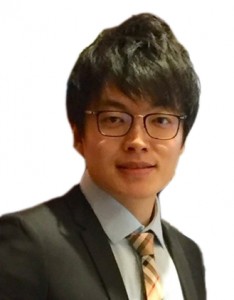Dr Xuekun Lu
BSc, PhD, FHEA
Senior Lecturer in Green Energy
ERC Consolidator Grant Awardee
EPSRC Open Postdoc Fellowship Awardee
EPSRC David Clarke Fellowship Awardee
UK National Measurement Fellow
STEM Ambassador
Deputy Chair of Undergraduate Subject Exam Board
Engineering 309, Mile End
| Feedback/ support hours: |
Tuesday 4 - 5 pm |
| Expertise: | My research group focuses on (1) revealing the interplay between 3D microstructure and the performance/failure mechanisms of the electrochemical energy devices (e.g., lithium-ion batteries, fuel cells etc) across multiple spatial and temporal domains using correlative operando characterisation techniques (X-ray CT, ptychography, XRD-CT, FIB-SEM, optical microscopy, etc); (2) multiscale multiphysics modelling (continuum and 3D microstructure-resolved) of the mass transport and electrochemical performance at the electrode, device and system level; (3) developing scalable and sustainable engineering solutions to fabricate advanced electrodes with tunable microstructure to unlock the full potential of the energy, power density and cycle life of next-generation lithium-ion batteries. |
| Research Centre: | Sustainable Engineering |
| Affiliations: | FHEA |
Brief Biography
I completed my PhD at the Manchester X-ray Imaging Facility, School of Materials Science, University of Manchester in 2015, supervised by the Regius Professor Philip Withers (FRS, FREng). My PhD research was focused on advanced material characterisation using 3D/4D X-ray computed tomography and diffraction techniques.
On completion of my PhD, I joined the Electrochemical Innovation Lab (EIL) at UCL in September 2015 as a PDRA to investigate the novel microstructure design, optimisation and manufacturing of energy conversion and storage materials and devices (e.g. tubular solid oxide fuel cells and lithium-ion batteries)
I started to work as a joint appointment between UCL/NPL in 2018, after receiving the National Measurement Fellowship, aiming to bridge the gap between academia and industry in addressing the key challenges in lithium-ion battery diagnostics and development. In 2021, I was awarded the NPL Rayleigh Award (Early Career). I am also the awardee of the prestigious EPSRC Open Fellowship. In 2025, I was awarded the prestigious ERC Consolidator Grant (â?¬2m).
I have been delivering world-leading research in Hydrogen Energy and Energy Storage: signified by 62 total publications (h-index 32, citation > 3400), 15 first-authored papers including Nature Nanotechnology, two papers in Nature Communications (IF:17.7), three papers in Energy & Environ. Sci. (IF:32.5) and one paper in Joule (IF: 46.04). Particularly, one of my papers in (2020) Nature Communications (doi.org/10.1038/s41467-020-15811-x) is featured ESI Highly Cited Paper (citation > 500), selected as Editor's Highlights, and became 2020 Top 50 Chemistry and Materials Sciences Articles; my another paper (2023) Nature Communications (2023), doi.org/10.1038/s41467-023-40574-6) hits The Top 25 Chemistry and Materials Sciences Articles of 2023.
My research outputs were frequently featured on the Research Highlights of the Faraday Institution and have given 10 invited talks at renowned institutions and conferences worldwide; I am also an invited Reviewer of the EPSRC Open Postdoctoral Fellowship, and of more than 20 top-ranking scientific journals such as Nature Communications and Advanced Energy Materials. My research output has been translated into the R&D of lithium-ion batteries by industry.
On completion of my PhD, I joined the Electrochemical Innovation Lab (EIL) at UCL in September 2015 as a PDRA to investigate the novel microstructure design, optimisation and manufacturing of energy conversion and storage materials and devices (e.g. tubular solid oxide fuel cells and lithium-ion batteries)
I started to work as a joint appointment between UCL/NPL in 2018, after receiving the National Measurement Fellowship, aiming to bridge the gap between academia and industry in addressing the key challenges in lithium-ion battery diagnostics and development. In 2021, I was awarded the NPL Rayleigh Award (Early Career). I am also the awardee of the prestigious EPSRC Open Fellowship. In 2025, I was awarded the prestigious ERC Consolidator Grant (â?¬2m).
I have been delivering world-leading research in Hydrogen Energy and Energy Storage: signified by 62 total publications (h-index 32, citation > 3400), 15 first-authored papers including Nature Nanotechnology, two papers in Nature Communications (IF:17.7), three papers in Energy & Environ. Sci. (IF:32.5) and one paper in Joule (IF: 46.04). Particularly, one of my papers in (2020) Nature Communications (doi.org/10.1038/s41467-020-15811-x) is featured ESI Highly Cited Paper (citation > 500), selected as Editor's Highlights, and became 2020 Top 50 Chemistry and Materials Sciences Articles; my another paper (2023) Nature Communications (2023), doi.org/10.1038/s41467-023-40574-6) hits The Top 25 Chemistry and Materials Sciences Articles of 2023.
My research outputs were frequently featured on the Research Highlights of the Faraday Institution and have given 10 invited talks at renowned institutions and conferences worldwide; I am also an invited Reviewer of the EPSRC Open Postdoctoral Fellowship, and of more than 20 top-ranking scientific journals such as Nature Communications and Advanced Energy Materials. My research output has been translated into the R&D of lithium-ion batteries by industry.





